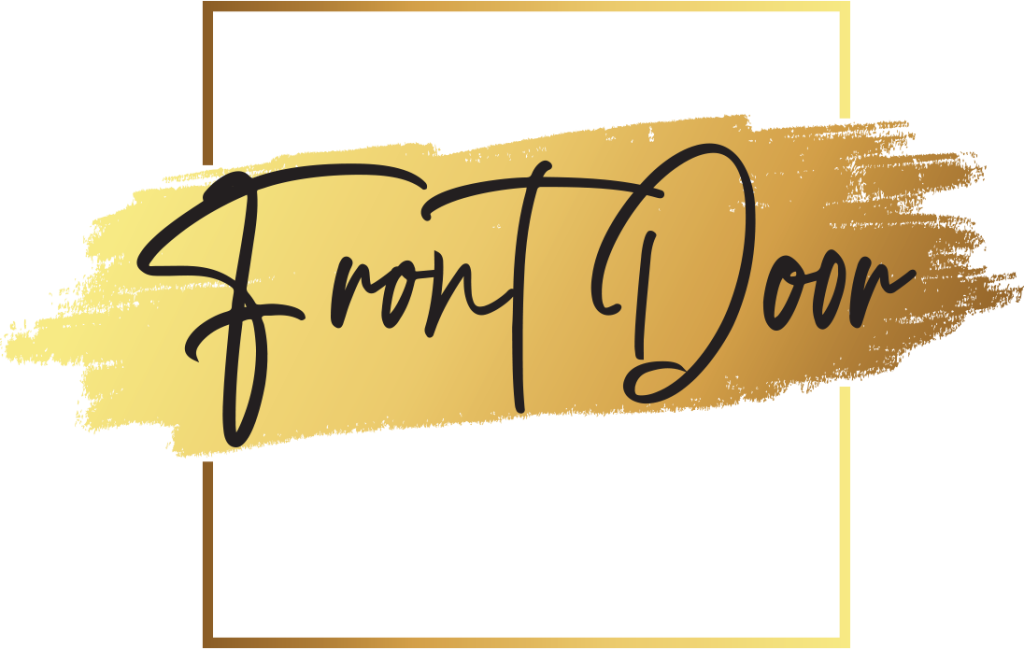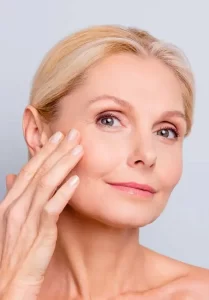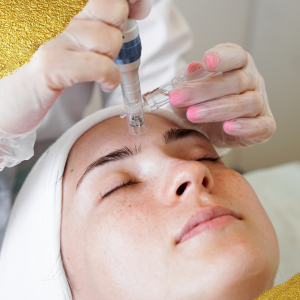Enhance and Improve Skin Texture with Skin Resurfacing
Uneven skin texture is a common skin concern that can affect individuals of all ages. This condition can manifest as rough patches, acne scars, enlarged pores, or fine lines and wrinkles, making the skin appear less smooth and radiant. At our Rochester, MI, medspa, we offer advanced skin resurfacing treatments designed to address and improve uneven skin texture, helping you achieve a smoother, more youthful complexion.
Contact Front Door Medspa® to get started today at 248-BESTSPA (237-8772)!
Types of Uneven Skin Textures
Uneven skin texture refers to the irregularities on the skin’s surface that cause it to feel rough or bumpy. Uneven texture can manifest in various ways, each with its unique appearance and potential causes:
- Roughness and Dryness: This common concern is characterized by a lack of hydration, leading to a dry, sandpapery feel and flaky patches. Causes include dry skin conditions like eczema, sun damage, harsh skincare products, and improper cleansing.
- Acne Scarring: Inflammatory acne can leave behind indented or raised scars that disrupt the skin’s smoothness. Factors like picking at blemishes and inadequate treatment can worsen scarring.
- Enlarged Pores: These widened openings on the skin’s surface can appear bumpy and contribute to unevenness. Genetics, oily skin, hormonal fluctuations, and sun damage can play a role.
- Fine Lines and Wrinkles: As skin loses collagen and elastin with age, fine lines and wrinkles develop, contributing to a textured appearance. Sun damage, smoking, and repetitive facial expressions can accelerate this process.
- Hyperpigmentation: This occurs when melanin production becomes uneven, leading to dark spots, patches, or discoloration. Sun damage, hormonal changes, and certain medications are contributing factors.
What Causes Uneven Skin Textures?
Some causes of uneven skin textures include:
- Aging: Natural skin aging contributes to dryness, loss of elasticity, and fine lines, impacting texture.
- Sun Damage: Ultraviolet radiation breaks down collagen and elastin, leading to dryness, wrinkles, and hyperpigmentation.
- Skin Conditions: Eczema, psoriasis, and acne can cause dryness, inflammation, and scarring, affecting skin texture.
- Hormonal Changes: Fluctuations in estrogen and progesterone during pregnancy, menstruation, and menopause can impact skin texture and pigmentation.
- Lifestyle Factors: Diet, smoking, stress, and lack of sleep can contribute to dryness, inflammation, and uneven texture.
- Genetics: Some skin texture concerns, such as enlarged pores, have a genetic component.
Signs
- Rough or bumpy skin
- Enlarged pores
- Acne scars
- Fine lines and wrinkles
- Uneven skin tone
- Dull complexion
- Excess dead skin cells
Skin Resurfacing Treatments for Uneven Skin Texture
Uneven skin texture can be a persistent concern, impacting your confidence and overall complexion. Fortunately, advancements in skin resurfacing treatments offer promising options for achieving a smoother, more radiant appearance.
Laser Resurfacing
This technology utilizes lasers to ablate (vaporize) the top layers of skin, stimulating collagen production and promoting a smoother appearance. Different types of lasers cater to specific needs, such as fractional lasers for fine lines and wrinkles or ablative lasers for deeper concerns.
Vampire Facials
During a vampire facial, your blood is drawn and processed to isolate platelet-rich plasma (PRP). This concentrated growth factor solution is then injected into the skin, further enhancing collagen production and promoting tissue regeneration.
Choosing the Right Treatment
The ideal treatment depends on your skin concerns, desired outcome, and level of tolerance. Consulting a qualified dermatologist is crucial for personalized assessment and guidance. They can consider factors like your skin type, severity of texture issues, and downtime preferences when recommending the best option.
Important Considerations
Some things to consider when undergoing skin resurfacing for uneven skint texture include:
- Downtime: Each treatment comes with varying degrees of downtime, impacting your daily activities. Chemical peels might cause mild peeling for a few days, while laser resurfacing may require weeks of healing.
- Potential Side Effects: Temporary side effects like redness, swelling, and sensitivity are possible with any procedure. Discuss potential risks and recovery time with your dermatologist.
- Cost: Skin resurfacing treatments vary in cost depending on the chosen method, the complexity of the procedure, and the practitioner’s expertise.
Aftercare for Skin Resurfacing Services for Skin Texture
Skin resurfacing treatments offer a powerful tool to combat uneven skin texture, revealing a smoother, more radiant complexion. However, the journey doesn’t end with the procedure itself. Proper aftercare is crucial for optimal results and minimizes the risk of complications. Here’s what you need to know:
- Gentle Cleanings and Hydration: Use lukewarm water and gentle, fragrance-free cleansers to avoid irritation. Apply a post-resurfacing moisturizer with hyaluronic acid, ceramides, and shea butter for intense hydration.
- Sunscreen: Sun exposure undermines your results and causes hyperpigmentation. Apply SPF 30+ broad-spectrum sunscreen every 2 hours, even on cloudy days.
- Avoid Harsh Products and Touching Your Face: Steer clear of exfoliants, astringents, and retinol until healing is complete. Don’t pick, rub, or scratch your treated skin to prevent scarring and infection.
- Soothing Solutions: Use cool compresses or calming masks to reduce discomfort and inflammation. Pay attention to your skin’s response and adjust your routine accordingly. Report excessive redness, swelling, or pain to your doctor.
- Embrace Patience and Downtime: Depending on the treatment, avoid strenuous activities, hot showers, and swimming for some time. Follow your doctor’s instructions for optimal healing. Remember, achieving optimal results takes time, so be patient with your skin.
Frequently Asked Questions
The duration of skin resurfacing for skin texture can vary depending on the specific procedure and the extent of the treatment. Non-invasive methods like microdermabrasion may only take 30 minutes to an hour per session, while more intensive procedures like laser resurfacing might require longer sessions or multiple treatments over several weeks.
As for pain during skin resurfacing, it also depends on the type of procedure. Non-invasive techniques generally cause minimal discomfort, with some mild sensations like tingling or warmth. More invasive procedures, such as ablative laser treatments, may involve some level of discomfort or pain. Your healthcare provider will often use local anesthesia or other pain management methods to make the experience more tolerable.
The cost of skin resurfacing treatments for skin texture varies widely based on factors like the type of procedure, the geographical location of the clinic, and the expertise of the practitioner. Non-invasive procedures like microdermabrasion may cost a few hundred dollars per session, while more advanced treatments like laser resurfacing can range from a few hundred to several thousand dollars per session. Consult with a qualified skincare professional to determine the most suitable treatment for your needs and to get an accurate cost estimate.
Looking to Improve Textured Skin? Contact Front Door Medspa®
Ready to treat uneven skin texture and achieve smoother, more radiant skin? Contact our Rochester medspa today at 248-BESTSPA (237-8772) to schedule your consultation and discover the best skin resurfacing treatment for you. Our experienced team is here to help you on your journey to a more youthful and confident complexion.
- Dermabrasion and Diamond Glow Facials
- Laser Skin Resurfacing
- Microneedling for Skin Resurfacing
- Skin Resurfacing Benefits
- Skin Resurfacing Cost
- Skin Resurfacing for Hyperpigmentation
- Skin Resurfacing for Scar Revision
- Skin Resurfacing for Uneven Skin Texture
- Skin Resurfacing for Wrinkles
- Skin Resurfacing Treatments
- Skin Resurfacing Treatments for Sun Damage
Get Directions



